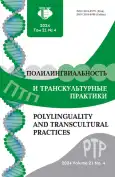The Emotional Component of Teaching RFL to Iranian Studentsas a Goal and Means of Achieving Optimal Results
- Авторлар: Rezvani V.1, Shuldishova A.A.2
-
Мекемелер:
- Alzahra University
- RUDN University
- Шығарылым: Том 21, № 4 (2024)
- Беттер: 796-809
- Бөлім: ARSENAL
- URL: https://journal-vniispk.ru/2618-897X/article/view/326902
- DOI: https://doi.org/10.22363/2618-897X-2024-21-4-796-809
- EDN: https://elibrary.ru/ELWAEE
- ID: 326902
Дәйексөз келтіру
Толық мәтін
Аннотация
The study analyzes the methods of motivation for teaching Russian to Iranian students; methodological approaches to using them in teaching technology are presented. The active methods of teaching, their features, and effectiveness for improving the quality of mastering the subject are considered, taking into account the opinions of Western and Russian scientists and teachers.In accordance with the task, the study is based on the results obtained in a survey concerning assessments and opinions about “emotional” methods of influencing the process of language acquisition. This inclusive concept applies to all pedagogical methods concerning students’ emotions. 114 undergraduate students in Russian at Iranian state universities took part in the survey. The survey was conducted in the context of the COVID-19 pandemic and focused on 1) determining the preferences given by students when choosing full-time or distance learning; 2) evaluating game tech-nologies (Role-playing), watching films, conducting discussions, staging performances by students; 3) evaluating the feasibility of using social networks and training programs, as well as the use of an interactive hybrid learning method. According to the survey results, 85.9% of students expressed dissatisfaction with the virtual learning process. 53% positively assessed the combined use of the above-mentioned methods.
Негізгі сөздер
Авторлар туралы
Vajihe Rezvani
Alzahra University
Email: v.rezvani@alzahra.ac.ir
ORCID iD: 0000-0002-5630-6178
PhD in Philology, Assistant professor, Head of the Department of Russian Language, Faculty of Literature
Islamic Republic of Iran, 1993893973, Tehran, North Sheikh Bahaee St, Deh-e VanakAlina Shuldishova
RUDN University
Хат алмасуға жауапты Автор.
Email: shuldishova_aa@pfur.ru
ORCID iD: 0000-0002-9603-8411
SPIN-код: 6181-7348
Scopus Author ID: 1026530
PhD in Philology, Associate Professor, Russian Language Department No. 5, Institute of the Russian Language
6 Miklukho-Maklaya St, Moscow, 117198, Russian FederationӘдебиет тізімі
- Balykhina, T.M. 2007. Methods of Teaching Russian as a Non-native, New Language. Moscow: RUDN Publ., 185 p. Print. (In Russ.)
- Kudryavtsev, V.T. 2010. “Freedom to learn: K. Rogers goes towards V.V. Davydov (contours of a new philosophy of education).ˮ Psychology and education, no 4, pp. 51–60. Print. (In Russ.)
- Pechnikov, A.N. 1996. “Features of educational motivation of cadets of law schools of the Ministry of Internal Affairs.ˮ Psychology: results and prospects: Abstracts of the scientific and practical conference. St. Petersburg, Print. (In Russ.)
- Richards, J.C., and T.S. Rodgers. 2010. Approaches and Methods in Language Teaching. Cambridge University Press.
- Sehran, D. 2020. “Students’ Opinions about the Distance Education to Art and Design Courses in the Pandemic Process.” World Journal of Education, vol. 10, no 3, p.113
- Klyachko, T.L., Novoseltsev A.V., Odoevskaya E.V., and S.G. Sinelnikov-Murylev. 2022. “Lessons Learned from the Coronavirus Pandemic and Possible Changes to Funding Mechanisms in Higher Education.” Educational Studies, no 1, pp. 8–30.
- Maly, Yu.M. 2018. Game technologies in the process of teaching a foreign language. Modern problems of philology and methods of teaching languages: questions of theory and practice. Kazan (Volga Region) Federal University, pp. 124–126. Print. (In Russ.)
- Habib, S. 2018. A Critique of Yalom’s Works. Nashre Ney.
- Lee, S.L. 2015. “Revisit Role-Playing Activities in Foreign Language Teaching and Learning: Remodeling Learners’ Cultural Identity.” Electronic Journal of Foreign Language Teaching, vol. 12, suppl. 1, pp. 346–359.
- Palfreyman, D. 2003. “Introduction: Culture and learner autonomy.” In D. Palfreyman & R.C. Smith (Eds.). Learner autonomy across cultures: Language education perspectives, pp. 1–19. Basingstoke. Palgrave Macmillan.
- Benson, P. 2011. Teaching and researching autonomy in language learning. Harlow: Longman.
- Borozdina, N.A. 2019. “Presentations, electronic portfolios and blogfolios in foreign language education: methodological principles and criteria of effectiveness, Innovative technologies of teaching a foreign language in higher education and school: implementation of modern Federal State Educational Standards.” In Collection of scientific papers based on the materials of the Fourth International Scientific and Practical Conference. Voronezh, pp.19–24. Print. (In Russ.)
- Arkhipova, T.L. Osipova N.V., and M.S. Lvov. 2015. “Social networks as a means of organizing the educational process.” Information Technologies in Education, no. 22, pp. 7–18. Print. (In Russ.)
Қосымша файлдар









